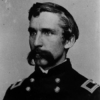Joshua Chamberlain

Joshua Chamberlain
Joshua Lawrence Chamberlain was an American college professor from the State of Maine, who volunteered during the American Civil War to join the Union Army. He became a highly respected and decorated Union officer, reaching the rank of brigadier general. He is most well known for his gallantry at the Battle of Gettysburg, which earned him the Medal of Honor...
NationalityAmerican
ProfessionWar Hero
Date of Birth8 September 1828
CityBrewer, ME
CountryUnited States of America
Just after writing those we were called up to defend a new position on the left, where the terrible storming of the bridge over the Antietam took place.
Every man I believe that God has given a Divine spark of soul.
I do not pretend to write much of a letter. You know under what circumstances I am writing.
We have to go in places no body would ever think of going into were it not for the necessities of war.
I long to be in the Field again, doing my part to keep the old flag up, with all its stars.
But we can hold our spirits and our bodies so pure and high, we may cherish such thoughts and such ideals, and dream such dreams of lofty purpose, that we can determine and know what manner of men we will be, whenever and wherever the hour strikes and calls to noble action.
Rations were scarcely issued, and the men about preparing supper, when rumors that the enemy had been encountered that day near Gettysburg absorbed every other interest, and very soon orders came to march forthwith to Gettysburg.
We fought no better, perhaps, than they. We exhibited, perhaps, no higher individual qualities.
This is the great reward of service, to live, far out and on, in the life of others; this is the mystery of Christ, - to give life's best for such high sake that it shall be found again unto life eternal.
Every pioneer and musician who could carry a musket went into the ranks. Even the sick and foot-sore, who could not keep up in the march, came up as soon as they could find their regiments, and took their places in line of battle, while it was battle, indeed.
Mounting a large rock, I was able to see a considerable body of the enemy moving by the flank in rear of their line engaged, and passing from the direction of the foot of Great Round Top through the valley toward the front of my left.
Our loss had been severe. One-half of my left wing had fallen, and a third of my regiment lay just behind us, dead or badly wounded.
My men moved out with a promptitude and spirit extraordinary, the cheers and welcome they received on the road adding to their enthusiasm.
But the cause for which we fought was higher; our thought wider... That thought was our power.